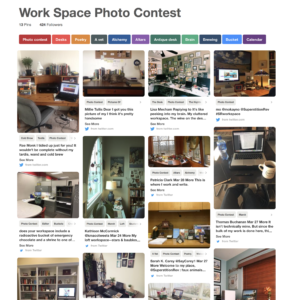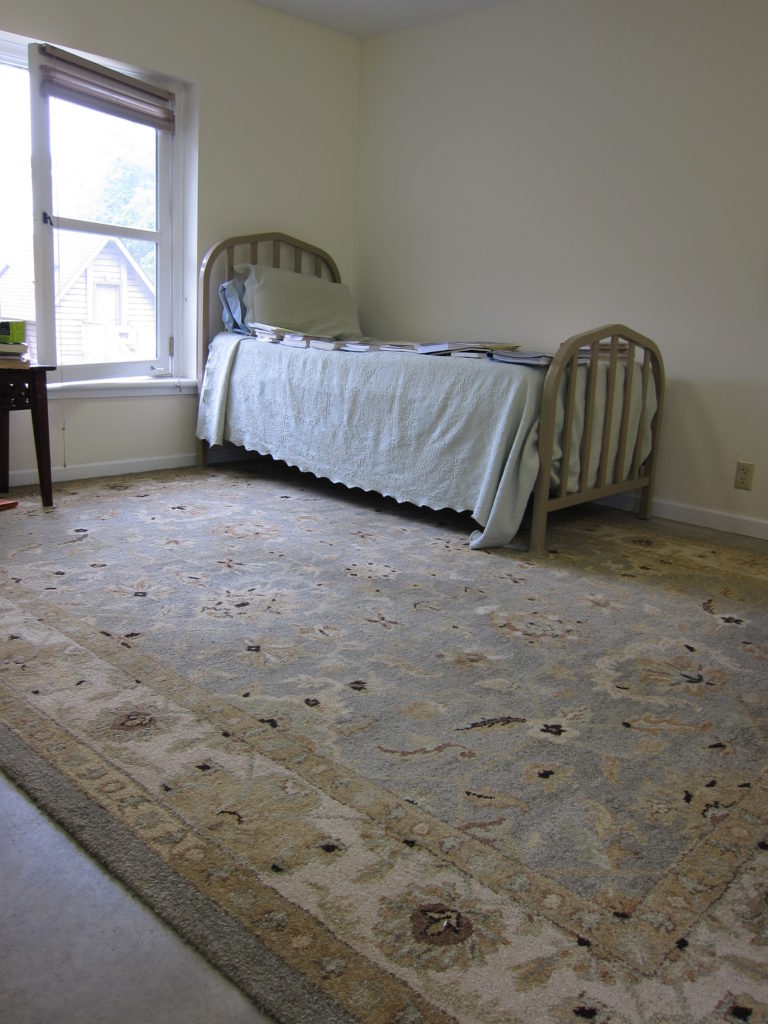 One day in late August I came home from work, deposited my school bag on the floor in my office, took a look around, and noticed immediately that things were just not right. My daughter’s hand-me-down laptop was on the desk, crowding out my own precious MacBook. A purple pencil topped with a feathery plume lay diagonally across a couple of sheets of half-drawn on printer paper, and there was a discarded branch of grape stems in one corner of the desk.
One day in late August I came home from work, deposited my school bag on the floor in my office, took a look around, and noticed immediately that things were just not right. My daughter’s hand-me-down laptop was on the desk, crowding out my own precious MacBook. A purple pencil topped with a feathery plume lay diagonally across a couple of sheets of half-drawn on printer paper, and there was a discarded branch of grape stems in one corner of the desk.
“Who’s been in my office?” I grouched, sounding just like one of the three bears from Goldilocks. “Someone’s been using my desk!”
I knew who the someone was, of course, even before my husband called back cheerfully from the kitchen that it was my daughter who had been in there earlier in the day. I just knew that the someone had been her.
“It’s my office,” I grumbled to myself in a low voice as I set about tidying up my desk. I was tired—that day had been the first one back after a too-short summer break sandwiched between teaching summer school and a week of mandatory faculty development meetings and soon, too soon, the start of classes. Gone were my gloriously productive mornings when I would get up a little before 7:00 and feed the cat, make myself a cup of tea, and sit at my desk, the promise of two whole uninterrupted hours of writing time spread before me like a flat beach at dawn. Yet as I tidied the desk area I scolded myself for being so melodramatically, disproportionately put out by the violation of my sacred space. It’s just a desk, I told myself. Just a room.
My room. My desk.
Reclaiming home office space as my own after years of not having a room with a desk and a door to call my own had been a major triumph. I had an office at work, of course, but it was shared space—work space, not writing space. I graded papers at the sunny kitchen table, but that wasn’t writing space. Writing space is a different kind of space. How it should look and feel depends on the person who must inhabit it. Like fingerprints, I bet no two writing rooms are alike. I couldn’t ever describe the ideal writing space to another person and come close to capturing just what makes it work for me. I couldn’t ever presume to tell another writer what their ideal space should be; it either works, or it doesn’t. Your space should fit around you, like a hand in your own, or like the way a small child’s body fits yours in all the right places, arms and legs curling against your own curves and edges.
***
My first “real” writing room was a bright, sunken sunroom in the upstate, New York apartment my husband and I rented for two years, before the landlords raised the rent and drove us to find cheaper digs. I loved that room. It had a heater running along the baseboard and my toes were always warm and cozy during the winter months (if you’ve never tried writing while warm air is blowing onto your toes then you should—it’s blissful!). When I sat at my desk, in front of my little Mac Classic, I could see through the interior window into our large living/dining room. My husband’s office was in the second bedroom—far enough away so he wasn’t a distraction, but close enough that we could shout to each other if we needed to. I shared the space with our aging gray dwarf rabbit and with the cat’s litterbox. I like to think that out of respect for my own creative processes, the cat refrained from using her box when I was working.
When we moved apartments, the cat, rabbit, and I shared a large closet off the corner of our master bedroom. The room was significantly smaller, but I was in front of a window again, and I liked the feeling of being tucked away, surrounded by the smell of wool and leather. The cat would jump onto one of the closet’s sweater shelves and sit there while I worked, surveying (perhaps critiquing) my progress. I took my Ph.D. qualifying exams in that closet office. I wrote essays for class, poems, short stories, letters, tinkered with a novel I had written back in college. When I became pregnant with my first child I kept a journal for him, and wrote the entries at that desk. The first time I felt my son moving inside of me I was in my closet office, gazing out at the dismal early winter landscape, and trying to feel inspired enough to write.
And then, somehow, between the birth of our son, our move from New York down to North Carolina, my new job teaching full-time, the birth of my daughter, I lost my room to write, and my writing self along with it. I was busy: mothering, teaching, still recovering from the shock of our move away from life in a vibrant section of a city to the numbing expanse of the suburban South. I could have fought for the right to have an acceptable room of my own to write but I didn’t. I had my office at work, and how could I have time to write, anyway? We moved first to a rental house, then took the plunge and purchased our first home—a small, one-story ranch with a partially-finished basement. We set up our desk and computer in the unfinished section of the basement, and in my mind I was already transforming the space into a writing nook—it could work, I convinced myself, trying not to look up at the exposed duct work, or down at the flat, bright green outdoor carpet at my feet. In the winter I had to share the nook with large, brown crickets, who popped spastically against my ankles, but still I persevered—until March of that first year, that is. One afternoon I checked the mail and found a letter addressed to a Mr. Beaumont* care of Beaumont’s mortuary—at our very same address. I asked our affable neighbor Mr. Rod if he could shed some light on this mystery and he laughed heartily like it was the best joke he’d heard all year, and told me that Mr. Beaumont used to live in our house, and had run a mortuary service out of the unfinished portion of our basement. Exposed duct work and crickets I could do; former mortuary I could not. If you want to know what does not make for a good writing room, I can tell you that would be a place where dead bodies once were stashed.
We moved. Our new (and current) house is bigger and better, and—bonus!—came with home office space. Life continued to be extraordinarily busy, in all the marvelous ways it is when you are raising small children, but also in bone-tiring, frightening ways, too. I needed every ounce of my emotional reserves and then some at times. Writing self would have to stay away. I kept the guiding light away from the front windows; barred the door; turned my back. We turned the office space over to our son, since it housed the family computer, and no one else had the time to use it, anyway. He took over the space enthusiastically, and from that point on the desk was always smeared with sticky fingerprints, and littered with half-finished glasses of water and mugs of milk, straws poking out at right angles. As time passed, and I began to feel that familiar tug to write—to write deeply and properly—again, I began to resent his appropriation of the space. I felt a restlessness stirring inside, like someone had reached through my chest and poked a long, hard finger straight into my heart. I wanted that room. I wanted that space. I wanted my writing self back. I missed her, I needed her.
Victory! My new office is a fabulous fusion of those other two beloved, upstate, New York rooms. I still share my space with a cat’s litterbox, and now with two fat guinea pigs, who will sit back on their haunches and place their tiny pink feet on the front bars of the cage and squeal for their salad when they hear my voice. Sometimes I read my writing out loud to them and they seem to listen, their jaws moving back and forth thoughtfully while they munch pellets. I like the smell of their warm, animal bodies, and sweet timothy hay. Sometimes the dog will wander in and plop her old bones down on the carpet with a heavy sigh. If I work too long the cat will walk across my keyboard and butt her head into my own. My window overlooks the screened-in porch. In the summer months, if I look to my right I can sometimes see the hummingbirds dipping into the nectar at the feeder. If I look to my left through the window in the spring I can just see the heavy, red blooms of the large camellia outside the porch.
It’s no wonder I am fiercely possessive of my writing room. My room. My desk. Yet even while I grouched to myself that August afternoon about my daughter’s trespass into my sacred space I realized, quite simply, that she had missed me, that was all. That evening I sat on her bed and told her about a great lady named Virginia Woolf, and about the importance of rooms, and I told her about the rooms I had known, (except I left out the mortuary part), and my search for my writing self. Then, right before I turned out her light, I helped my daughter rearrange her own desk: Purple pencil on the right, lava lamp on the left; framed print of the Wright brothers’ flyer above, sewing boxes below. I watched her try out the space for size. I made a wish: let this be the first space of many for her. Let her always have a place to write, to dream, to draw, to invent, to imagine, to soar.
*not his real name



